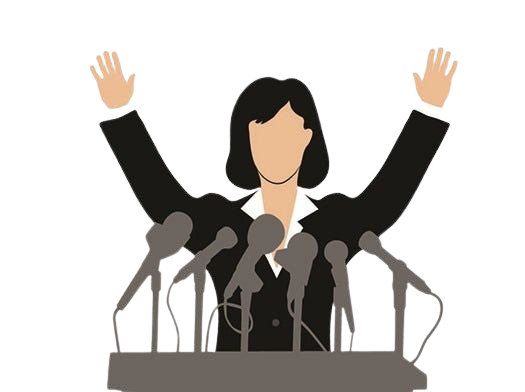

FROM BEIRUT
TO WASHINGTON:
A COMPARATIVE ANALYSIS OF THE INFLUENCE OF MEDIA REPRESENTATION ON WOMEN'S POLITICAL PARTICIPATION
MEERNA YAMUT
MENTOR: DR. FIRAT ORUC

introduction
I am Meerna Yamut, a Lebanese American student majoring in Culture and Politics and minoring in Government at Georgetown University in Qatar. While I have spent most of my life in Qatar, naturally, I was a bit disconnected from two monumental parts of my identity. I have not been to Lebanon for 13 years, and I have not been to America for 20 years (except for a one-week trip with Georgetown, "Women as Changemakers"). Hence, I always experienced an identity crisis encompassing all of these various cultural interactions that heavily impacted me in many ways. These impacts range from the strength of the languages I speak, my accent, my attire, my behavior, and most importantly, my beliefs and perceptions.
However, with this physical disconnect, my perceptions of both countries came from sources that were mainly digital. It was heavily reliant on the media, ranging from online newspapers and magazines to social media, films, and news channels. However, after viewing multiple media outlets, I rarely ever saw a female politician on screen or even heard of them through public conversation regularly. I always saw male politicians on screen, read their names in newspapers, heard of them in the day-to-day political debates and conversations, and even studied thoroughly about them in school. The buildings were named after them, memorials were built in their honor, and their social perceptions and political credibility were always on the tip of everyone's tongue. The same could not be said for their female counterparts. Hence, I wanted to analyze and compare different perceptions and effects that the media causes across my two cultural components with a specific lens focusing on female political participants. Especially, considering my cultural and political field of study and my identity as a female Lebanese American, I wanted to explore how women in these two countries find that the media impacts their political participation and how feasible pursuing a career in politics is. While women are known to be a minority in the political arena globally, applying a personal cultural lens that compares the Eastern and Western media and its political and social impacts would make this project more intriguing while also addressing the broader issues of media framing and stereotyping, patriarchal societies, and the large exclusion of women in politics. This exclusion diminishes the representation of half of the population and does not give a chance for womens’ intellectual and enriching qualities to serve as an asset to countries and their respective governments. Therefore, it is imperative to locate the issue within the media and carefully assess the similarities and differences between segments of the East and West. The solution to the problem must come from the ground up which calls for a grassroots movement in reshaping the way the media portrays women and their societal perceptions in politics.

defining political participation
While there has been improvement in female political participation over the years, the change is still insignificant and sometimes stagnant. This lack of progression contributes to the silencing of the voices of women and their representation in a male-dominated society and political field. It is important to note that female political participation should be equal to male political participation. None is better than the other and there should not be an overpowering force from either sides that diminishes the efforts of the other, for both opinions and strategies are needed and valuable for the betterment and equity of society. However, there is a dire need to focus on the empowerment of women in political participation as they represent a far too small minority which hinders the advancement of policymaking and the betterment of society. Hence, it raises the question of the definition of female political participation and what constitues
an equivalent level of such participation?
Female political participation is defined as the ability of women “to participate equally with men, at all levels, and in all aspects of political life and decision-making” (UNWOMEN). This research covers all forms of political participation regardless of position. Female political participation could be achieved through activism, official government positions, or scholarly work regarding politics. This project aims to interview women across all these forms of political participation from the United States and Lebanon to measure key differences and similarities between the two countries and the media portrayal of their female political participants.
defining media representation

The simple definition of media representation is that it is how media outlets, such as television, social media, film, magazines, and newspapers, portray certain groups or communities.
What’s the importance of representation?
According to the Arab Film & Media Institute, "Strong and positive representation can help fight and break down stereotypes that can be detrimental to individuals and limiting to society. When a group of people is only ever represented in negative ways, it adversely affects the way others see them, as well as the way they see themselves" (Tawil 2020). This indicates that the representation of female political participants is monumental to their performance. If female political participants were represented positively, then their self-confidence and determination would increase, which also increases their influence and capabilities. "It offers them role models to look up to and people and characters to be inspired by and reinforces that they are not lesser than" (Tawil 2020).
 |  |  |
|---|---|---|
 |  |  |